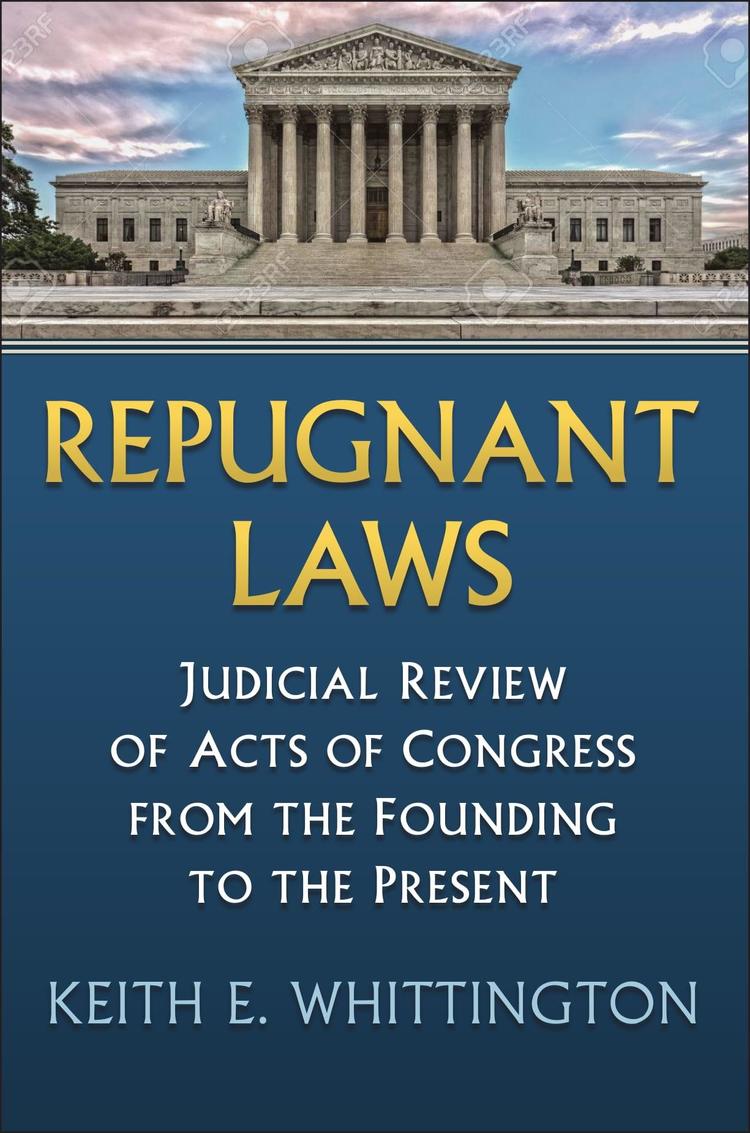
Repugnant Laws: Judicial Review of Acts of Congress from the Founding to the Present (Lawrence: University Press of Kansas, 2019). Buy It!
Winner of the Thomas M. Cooley Book Prize, Georgetown Center for the Constitution
Part of the Constitutional Thinking series
University Press of Kansas description
Judicial Review of Congress database
When the Supreme Court strikes down favored legislation, politicians cry judicial activism. When the law is one politicians oppose, the Court is heroically righting a wrong. In our polarized moment of partisan fervor, the Supreme Court's routine work of judicial review is increasingly viewed through a political lens, decried by one side or the other as judicial overreach--"legislating from the bench." But is this really the case? Keith E. Whittington asks in Repugnant Laws, a first-of-its-kind history of judicial review.
A thorough examination of the record of judicial review requires, first of all, a comprehensive inventory of relevant cases. To this end, Whittington revises the extant catalog of cases in which the Court has struck down a federal statute, and adds to this, for the first time, a complete catalog of cases upholding laws of Congress against constitutional challenge. With reference to this inventory, Whittington is then able to offer a reassessment of the prevalence of judicial review, an account of how the power of judicial review has evolved over time, and a persuasive challenge to the idea of an anti-democratic, heroic Court. In this analysis, it becomes apparent that that the Court is: political and often partisan, operating as a political ally to dominant political coalitions; vulnerable, largely unable to sustain consistent opposition to the policy priorities of empowered political majorities; and quasi-independent, actively exercising the power of judicial review to pursue the justices' own priorities within bounds of what is politically tolerable.
The Court, Repugnant Laws suggests, is a political institution, operating in a political environment to advance controversial principles, often with the aid of political leaders who sometimes encourage and generally tolerate the judicial nullification of federal laws because it serves their own interests to do so. In the midst of heated battles over partisan and activist Supreme Court justices, Keith Whittington's work reminds us that, for better or for worse, the Court reflects the politics of its time.
Reviews:
Outstanding Academic Title. "The most heralded works of political science tend to provide readers with either a well-supported original argument or useful reference materials and findings that others can build on. In Repugnant Laws, Whittington (Princeton) does both." -- David Yalof, Choice
"An impressively thorough, empirical study of judicial review. . . . A landmark achievement." -- Michael S. Greve, Claremont Review of Books
"Magisterial and meticulous . . . . sure to set the standard for books of its kind for decades to come." -- Michael M. Rosen, The American Interest
"A highly textured analysis of the nature, scope, and implications of judicial review over time. . . . Any scholar interested in judicial review or U.S. political history will find the book useful." -- Sean Gailmard, Journal of Interdisciplinary History
"Perhaps the most comprehensive guide to the actual practice of judicial review ever produced." -- John W. Compton, Constitutional Commentary
"A characteristically thoughtful and careful work. . . . a major contribution to the field. . . . An impressive piece of scholarship that provides a comprehensive account of how the Supreme Court has used judicial review for multiple purposes, not merely to check congressional power but also to constitute it." -- Joshua Strayhorn, Political Science Quarterly
"Whittington has written an excellent book. . . . Whittington's impressive data collection and insightful analysis give readers as full a picture as exists of the Court's use of one of its most important tools." -- Andrew J. O'Green, Law and Politics Book Review
Symposia:
Constitutional Commentary 35:1 (Spring 2020) Read Online
Georgetown Journal of Law & Public Policy 19:2 (Summer 2021) Read Online
Extended Media Discussions:
- AEI's Unprecedential with Adam White (April 9, 2020) Listen Online
- The Remnant with Jonah Goldberg (February 27, 2020) Listen Online
- The Bob Zadek Show (February 23, 2020) Listen Online
- American Enterprise Institute Book Forum (February 21, 2020) Watch Online
- Cato Institute Book Forum (November 21, 2019) Watch Online
- James Madison Program Book Forum (November 14, 2019) Watch Online
- "The Politics of Judicial Review: A Conversation with Keith Whittington," Liberty Law Talk Podcast (August 1, 2019) Listen Online
Endorsements:
“As contemporary judicial selection politics amplify the urgency of discussions regarding judicial activism, the Court’s legitimacy, and the relationship between party and judicial office, Whittington’s study reminds readers that the Supreme Court has long acted as a nation-builder and an arm of the national state, operating within partisan politics. In stressing ‘the conditional quality of judicial independence,’ Whittington offers the counsel of perspective on our current era of partisan polarization and strained inter-branch relations.” — Nancy Maveety, author of Queen’s Court: Judicial Power in the Rehnquist Era
“Keith Whittington’s invaluable and comprehensive survey of Supreme Court decisions striking down — and upholding — federal statutes carefully maps the complex relations between the Court and the political coalitions that produce, support, or sometimes abandon the laws the Court reviews. Bringing insights from American political development to bear, Whittington has supplanted Robert Dahl’s classic work while preserving its core. Everyone interested in American political development and the Supreme Court must now take this work into account.” — Mark Tushnet, William Nelson Cromwell Professor of Law, Harvard Law School
“Any book by Keith Whittington is an important book, and this one is no exception. Facts matter and this book provides them. From now on, no discussion of the practice of judicial review can ignore its empirical findings. The most cynical political scientist will need to come to grips with its conclusion that ‘the justices are not lapdogs, and they have often bitten the hand of the party that put them on the bench.’ At the same time, idealists will need to incorporate its findings that the ‘justices have proven themselves to be allies of [their] political coalition leaders.’ Simply a must-read for any serious student of our Constitution and how it actually works.” — Randy Barnett, Director of Georgetown Center for the Constitution and author of Our Republican Constitution: Securing the Liberty and Sovereignty of We the People

